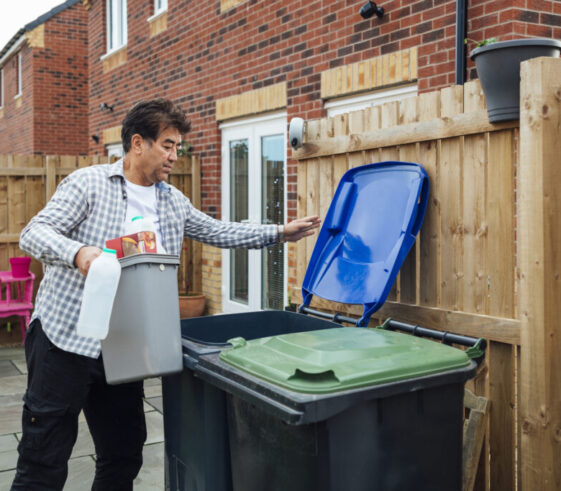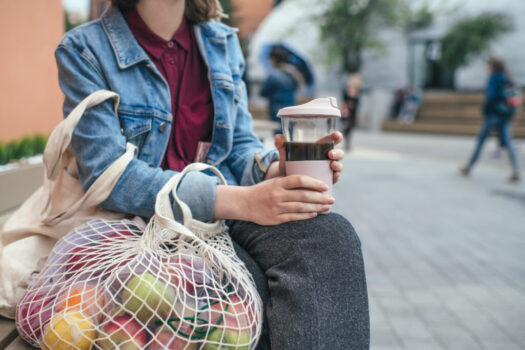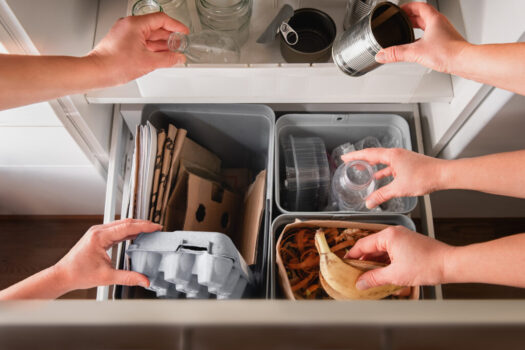On average, in the UK we throw away our own body weight in rubbish every seven weeks.
Reducing waste helps to reduce the amount of pollution that is being released into the environment, which can have serious consequences for the health of both humans and animals.
It is also beneficial for the environment because it helps to conserve natural resources, such as water and energy protecting them for future generations.
What happens to your waste?
In Staffordshire, most of the waste which is not re-used or recycled is sent to one of our two Energy Recovery Facilities, where it is burnt and used as a fuel to generate electricity. In fact, the facilities generate enough fuel to power the lights in over 60,000 homes.
Whilst these plants are a much better option than sending waste to landfill, it is more important to reduce, reuse and recycle as much as possible to keep valuable resources in circulation for longer.

10 top tips to reduce your household waste
- Think about the products you purchase and look for reusable or recyclable packaging.
- Donate or repurpose items you no longer need instead of throwing them away.
- Compost food scraps to create nutrient-rich soil for your garden.
- Use reusable containers for food storage.
- Buy in bulk to reduce packaging waste.
- Take reusable bags to the grocery store instead of using plastic bags.
- Choose products that are refillable or have minimal packaging.
- Turn off lights, appliances, and other electronics when not in use.
- Reuse old newspapers, paper bags, and other materials for crafts.
- Repair broken items instead of throwing them away.
Reduce
Reducing the amount of waste we produce is a great way to lessen our impact on the environment and can save money.
- Cutting down on food waste by planning the food shopping and only buy what we need. Did you know the average family could save £700 a year by simply reducing the amount of food being thrown away?
- Buying products with less packaging. Try to avoid buying items which are individually wrapped. Where possible look out for refill packs or concentrated products, or products that can be used more than once, for example, rechargeable batteries.
- Take a re-usable carrier bag shopping with you.
- Stop getting junk mail through the door.
- Avoid single use items such as disposal coffee cups and opt for a re-usable mug.




Reuse
Reusing items is a great way to reduce your environmental impact. Plus, it can save you money by reducing the need to purchase new items. In addition, reusing items is a great way to show your commitment to sustainability, which is becoming increasingly important.
- Donate it – Reuse items that are still in good condition by donating them to a local charity or thrift store.
- Compost food scraps and organic waste to create nutrient-rich soil for your garden.
- Upcycle items by repurposing them into something new, like turning old jeans into a shopping bag or turning a Mason jar into a vase.
- Sell it – There are a variety of online selling arenas, such as eBay, Vinted, Facebook Marketplace and Depop. If you have quite a few items why not consider a car boot sale?
- Give it away – One person’s, trash is another person’s treasure. Networks like Freecycle allows members to advertise goods for reuse or sharing for free.
Recycle
If you can’t reduce or reuse, the next best option is to recycle your unwanted items. Recycling is a process that turns unwanted items into something new. This helps to save on resources by reducing the need to extract new materials and requires less energy.
Staffordshire provides lots of ways for you to recycle, if you are unsure if it can be recycled, please check first. It is important not to mix non-recyclable waste in the recycling collections as this can contaminate the load and could lead the whole load being rejected from the recycling facility.

